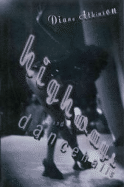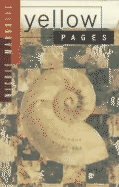Other Women

by Evelyn Lau,
144 pages,
ISBN: 0394224779
Highways & Dancehalls

by Diana Atkinson,
226 pages,
ISBN: 0394280628
Yellow Pages:
A Catalogue of Intentions

by Nicole Markotic,
168 pages,
ISBN: 0889951322
Parachutes

by Marianne Middelveen,
330 pages,
ISBN: 0920953832
Undefended Borders

by Charles Long,
256 pages,
ISBN: 1895629462
Post Your Opinion | | First Novels - The Young and Rebellious
by Eva TihanyiTHE LIFE OF A WEST Coast stripper depicted in Diana Atkinson's Highways and Dancehalls (Knopf, 235 pages, $25 cloth) is, despite the book's mundane title, intriguing. Atkinson chronicles a two-year period in the life of Sarah (stage name: Tabitha), daughter of an English professor and victim of a callous medical profession that injured her both emotionally and physically. Throughout her childhood, Sarah suffered from colitis, which was eventually cured by surgery that left her stomach scarred. She starts stripping at 17 not only because she is "a lousy waitress" but because she seeks from others the approval she cannot give herself. She needs to feel she has "something they want."
Although the black light in the bars renders the blemish on her stomach invisible, Sarah still thinks of herself as a "scarred geek," continually trying to affirm her own reality and find value in it:
I look in the mirror and am reassured. Plausible. I look the part. I just keep running my fingertips over my chin and throat and the silky undersides of my breasts. Mapping out the territory. I am real and I am still here.
The issue of exploitation as conventionally associated with strippers doesn't enter the picture for Sarah. When a patron's girlfriend asks her if she feels exploited, Sarah answers with a blunt no: "I don't see it. I figure I'm the exploiter. I mean, look at these guys. ... I'm exploiting the fact that they think with their balls." Yet when the girlfriend says she doesn't buy it, asks how Sarah can "choose to participate in this system," Sarah yells, "Because I'm tucked up!" and runs from the room to curl up on the bathroom floor.
Atkinson's empathy for Sarah is contagious. It's hard not to respond to such a strange anomaly: an intellectual stripper who makes reference to Colette, Death of a Salesman, pre-Christian matriarchal culture, and doppelgangers, to name but a few of the topics on which her thoughts alight. At the same time, the danger, loneliness, boredom, and obsession with appearances that are an integral part of the stripper's life are also acutely filtered through Sarah's perception. Her witty turns of phrase and self-deprecating, down-to-earth humour are delightful. Who can resist the mind of a woman who compares her mother's whining to "a possessed vacuum cleaner preparing to levitate and fly out the window"; or describes a matron's hair as "a scrambled nest of peroxide"; or who admires a bartender's motorcycle, then ruefully remarks to herself: "Too bad there isn't some way you can ditch the guy and fuck the bike. I must be tired."
Through Sarah, Atkinson portrays strippers not in a cause-of-the-day sense, but as human beings with souls as well as bodies.
The front-cover photograph of a Yanomami woman breast-feeding an ocelot, combined with a title that is Venezuelan slang for condoms, sets up the expectation that Marianne Middelveen's Parachutes (Cormorant, 327 pages, $16.95 paper) is going to be an unusual novel. Set at INSA, a medical-research institute in the Amazon Territory, it tells the story of the dermatologist Debra Baumstark, a politically naive but opinionated American who is invited by the slick, self-promoting head of the organization, Diego Velasquez, to work for him. Velasquez figures that having an American on his team will help him win credibility and financing. Soon, however, he realizes that Debra -- who carries on a love affair with the local communist leader, Segundo, and behaves generally in a manner he considers unacceptable (she doesn't defer to him in any way) -- is a liability, not an asset.
Eventually, her affair with Segundo proves to be Debra's downfall, and pits her against Velasquez, the CIA, a group of overzealous right-wing missionaries, and the local police.
As the affair progresses, so too does Debra's firsthand education about real life in the tropics. The glossy, idealized magazine portrayals she was so taken with back home in Miami now seem like a Hollywood invention. What she sees is the destruction of native life -- both human and environmental -- by missionary interference on the one hand and scientific hubris and ambition on the other. When, for instance, contact was first made with the Yanomami tribe, many died of the common cold because they had no resistance to the intruders' diseases. Once Debra recognizes that the institute often uses the Yanomami as unwitting experimental 11 guinea pigs," she is disgusted and does not hesitate to say so. Unfortunately, no one wants to listen; everyone is too busy promoting his or her own agenda.
From Debra's perspective, the Americans and the Venezuelans are equally guilty. Both exploit and corrupt (under the guise of "development") the people they claim to be helping.
The book abounds with medical terminology ("oedematous fingers ... .. sputum samples," "viable organisms," "mycology"), which, although effective in contrasting the cold, scientific approach with the ways of the people it is foisted upon, does become tedious. It also distances us from Debra herself. We learn little about her personally, except that she enjoys sex, speaks her mind, and is angered by the injustices she witnesses. The book would have packed a far greater punch had Middelveen allowed the reader to get to know Debra better, instead of using her as a moral mouthpiece.
Maggie, the primary focus in Charles Long's superb Undefended Border (Warwick Publishing, 337 pages, $14.95 paper), is far more appealing and credible. She is a wonderful creation: a young, independent woman with a throaty laugh, a quick mind that relishes puns, a restless nature, and an unnerving propensity to question everything.
It is 1969 when Maggie travels from Toronto to Eagle Bluff, Ohio, to research a book about the Underground Railway. Eliza from Uncle Tom's Cabin escaped across the frozen Ohio River near Eagle Bluff, a detail which is the town's only claim to fame.
The story opens on the bluffs above town where Maggie meets David, a college drop-out whose mother is founder and sole minister of American Holiness, a "sort of Baptist" local sect. He is immediately drawn to Maggie and offers to help her find a place to stay. They become lovers, and the novel centres on how their relationship unfolds. However, Long frequently intersperses his main narrative with lengthy flashbacks -- to Maggie's childhood in late '50s Rockport, Ontario (a town which was literally wiped out by the opening of the St. Lawrence Seaway in 1957), and to David's childhood in the Eagle Bluff of the same period.
These flashbacks show the roots of the adult lives Maggie and David are living. Their personalities are evident in their early lives: her rebelliousness, acute sense of irony, and blatantly asserted sense of self, his law-abiding, mild- mannered, naive charm. As the book's title suggests, Long is concerned with the idea of borders: geographical, cultural, personal; between childhood and adulthood, men and women, parents and children, Americans and Canadians, blacks and whites, believers and non-believers. The book reverberates with the complexity of life, of Maggie's and David's struggle to cross the lines.
Fiona and Raymond, the mismatched lovers in Evelyn Lau's first full-length fictional narrative, are about as different from Maggie and David as one could imagine. In Other Women (Random House, 194 pages, $25 cloth) Lau recreates the classic triangle: a successful middle-aged married man, his wife, and his young mistress -the odd twist here being that the man and his mistress never consummate their passion. In fact, the novel is largely about how one-sided and frustrating this passion actually is. Raymond makes it clear to Fiona that he will never leave his wife; Fiona pines for him anyway. After 15 months of involvement (if one can call their occasional hot- but-leading-nowhere encounters an "involvement"), he cuts all contact with her. She deals with her misery by drinking a lot, watching movies, thinking about Raymond, and fantasizing about confronting his wife.
Lau is once again covering the territory that seems to have become her trade mark: the perilous, obsessive, demoralizing side of sexual desire. This is a landscape in which pain and betrayal are the distinguishing features, and people are as disposable as Kleenex. What bothers Fiona most
is her inability to matter to Raymond, to affect his life. When she bites him, it is in a desperate attempt "to leave a mark upon him." She never does. The irony, of course, is that Raymond's wife is the "other woman" here -- the wife getting in the way of the mistress rather than the other way around.
The relationships explored by Nicole Markotic in Yellow Pages (Red Deer College, 164 pages, $12.95 paper) are of an entirely different variety. Markotic focuses on the early life of Alexander Graham Bell. There is Bell's family (a deaf mother and linguist father, an older brother who dies of TB at 25) and his first love, Marie. And later, there is Thomas, Bell's assistant, and May Hubbard, the deaf daughter of a wealthy Massachusetts businessman who funds Bell's experiments. Bell, like May's father, is an oralist who believes that sign language should not be taught because it segregates the deaf into a world of deaf people, and much of the tension in the story arises from this. May, who becomes Bell's wife, narrates part of the book, and through her eyes we see the human being behind the inventor.
Markotic employs an intense, symbolic style, using voice and language as recurring motifs. Like an extended metaphor in a long poem, they lend unity to the work. Partly fiction, partly biography, partly a commentary on communication, Yellow Pages expresses the poem in Bell's story. |